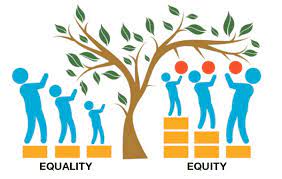Q. Is inclusive growth possible under market economy ? State the significance of financial inclusion in achieving economic growth in India.
Ans: Inclusive growth refers to a form of economic development that benefits all segments of society, ensuring that the benefits of growth are shared equitably across various income groups and social strata. It aims to reduce poverty, inequality, and disparities in access to opportunities and resources. While market economies are primarily driven by the private sector and market forces, it is possible to achieve inclusive growth under a market economy, provided that certain conditions are met and appropriate policies are implemented.

Ways in which inclusive growth can be promoted within a market economy
- Pro-Poor Policies: Governments can implement policies that target poverty reduction and social welfare, such as targeted subsidies, cash transfers, and social safety nets. These policies help ensure that the most vulnerable members of society have access to basic necessities.
- Investment in Human Capital: Investing in education, healthcare, and skill development enables individuals to participate more fully in economic activities and take advantage of opportunities. This enhances their ability to contribute to and benefit from economic growth.
- Labor Market Reforms: Labor market policies that promote fair wages, worker rights, and job security contribute to reducing income inequality and improving the livelihoods of workers.
- Access to Credit and Finance: Providing access to credit and financial services to marginalized and underserved populations enables them to start businesses, invest in productive assets, and participate in economic activities.
- Infrastructure Development: Building and improving infrastructure, such as roads, transportation, and energy systems, can create jobs, stimulate economic activity, and enhance the overall quality of life, especially in rural and less developed areas.
- Support for Small and Medium Enterprises (SMEs): SMEs often provide a significant source of employment and contribute to local economies. Policies that support SMEs can lead to more inclusive economic growth.
- Rural Development: Focusing on the development of rural areas helps reduce urban-rural disparities and provides opportunities for rural populations to participate in economic activities.
Significance of financial inclusion in achieving economic growth in India
Financial inclusion refers to providing access to formal financial services, such as banking, credit, insurance, and savings, to all segments of the population, particularly those who are underserved or excluded from the formal financial system. In the context of India, where a significant portion of the population resides in rural and economically disadvantaged areas, financial inclusion plays a crucial role in promoting inclusive growth. Here’s why:
- Access to Capital: Financial inclusion enables individuals, especially in rural areas and among marginalized communities, to access credit and capital for entrepreneurial activities, small businesses, and agriculture. This leads to increased economic activity, job creation, and income generation.
- Savings and Risk Management: Access to formal financial services allows households to save money securely and manage risks more effectively through insurance products. This enhances financial stability and resilience, particularly in times of economic shocks or emergencies.
- Investment in Human Capital: Financial inclusion facilitates investment in education, healthcare, and skill development, enabling individuals to improve their human capital and contribute more effectively to the workforce and the economy.
- Reduced Income Inequality: By providing opportunities for underserved populations to participate in formal financial markets, financial inclusion helps reduce income inequality and empowers marginalized groups.
- Digital Economy Participation: Financial inclusion often involves leveraging digital technologies for financial transactions, which can promote access to online markets, e-commerce, and digital payment systems. This enhances participation in the broader economy.
- Women’s Empowerment: Financial inclusion can particularly benefit women, as it gives them greater control over household finances, the ability to save and invest, and access to credit for income-generating activities.
- Economic Productivity: A financially inclusive population is better equipped to invest in productive assets, seize economic opportunities, and contribute to overall economic growth.
The Indian government has been actively working to promote financial inclusion through initiatives like Jan Dhan Yojana (financial inclusion program), Aadhaar (unique identification system), and digital payment platforms. These efforts aim to bring a larger portion of the population into the formal financial system, thereby contributing to more inclusive and sustainable economic growth.
Thanks for reading answer to the question: Is inclusive growth possible under market economy ? State the significance of financial inclusion in achieving economic growth in India.
Read: